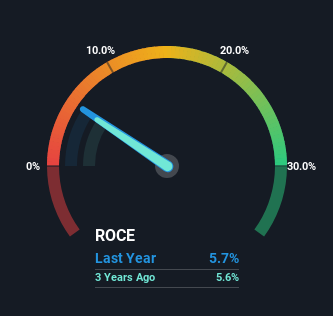Here's What To Make Of Black Hills' (NYSE:BKH) Decelerating Rates Of Return
If you're looking for a multi-bagger, there's a few things to keep an eye out for. Typically, we'll want to notice a trend of growing return on capital employed (ROCE) and alongside that, an expanding base of capital employed. If you see this, it typically means it's a company with a great business model and plenty of profitable reinvestment opportunities. However, after briefly looking over the numbers, we don't think Black Hills (NYSE:BKH) has the makings of a multi-bagger going forward, but let's have a look at why that may be.
What Is Return On Capital Employed (ROCE)?
If you haven't worked with ROCE before, it measures the 'return' (pre-tax profit) a company generates from capital employed in its business. Analysts use this formula to calculate it for Black Hills:
Return on Capital Employed = Earnings Before Interest and Tax (EBIT) ÷ (Total Assets - Current Liabilities)
0.057 = US$487m ÷ (US$9.7b - US$1.1b) (Based on the trailing twelve months to March 2024).
So, Black Hills has an ROCE of 5.7%. In absolute terms, that's a low return but it's around the Integrated Utilities industry average of 5.0%.
Check out our latest analysis for Black Hills
In the above chart we have measured Black Hills' prior ROCE against its prior performance, but the future is arguably more important. If you'd like to see what analysts are forecasting going forward, you should check out our free analyst report for Black Hills .
The Trend Of ROCE
In terms of Black Hills' historical ROCE trend, it doesn't exactly demand attention. The company has consistently earned 5.7% for the last five years, and the capital employed within the business has risen 33% in that time. Given the company has increased the amount of capital employed, it appears the investments that have been made simply don't provide a high return on capital.
In Conclusion...
As we've seen above, Black Hills' returns on capital haven't increased but it is reinvesting in the business. And in the last five years, the stock has given away 18% so the market doesn't look too hopeful on these trends strengthening any time soon. On the whole, we aren't too inspired by the underlying trends and we think there may be better chances of finding a multi-bagger elsewhere.
If you want to know some of the risks facing Black Hills we've found 2 warning signs (1 is significant!) that you should be aware of before investing here.
While Black Hills may not currently earn the highest returns, we've compiled a list of companies that currently earn more than 25% return on equity. Check out this free list here.
Have feedback on this article? Concerned about the content? Get in touch with us directly. Alternatively, email editorial-team (at) simplywallst.com.
This article by Simply Wall St is general in nature. We provide commentary based on historical data and analyst forecasts only using an unbiased methodology and our articles are not intended to be financial advice. It does not constitute a recommendation to buy or sell any stock, and does not take account of your objectives, or your financial situation. We aim to bring you long-term focused analysis driven by fundamental data. Note that our analysis may not factor in the latest price-sensitive company announcements or qualitative material. Simply Wall St has no position in any stocks mentioned.
Have feedback on this article? Concerned about the content? Get in touch with us directly. Alternatively, email editorial-team@simplywallst.com

 Yahoo Finance
Yahoo Finance 
